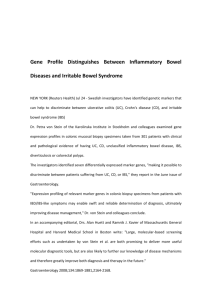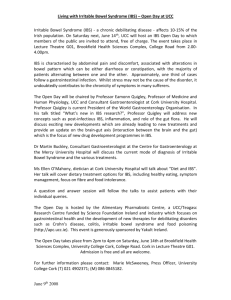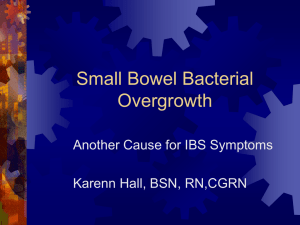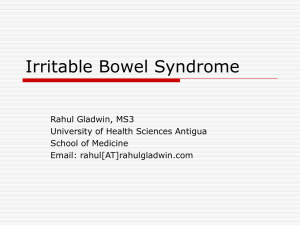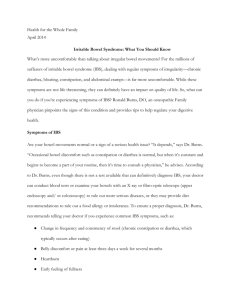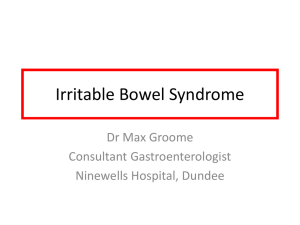IRRITABLE BOWEL SYNDROME (IBS)
advertisement
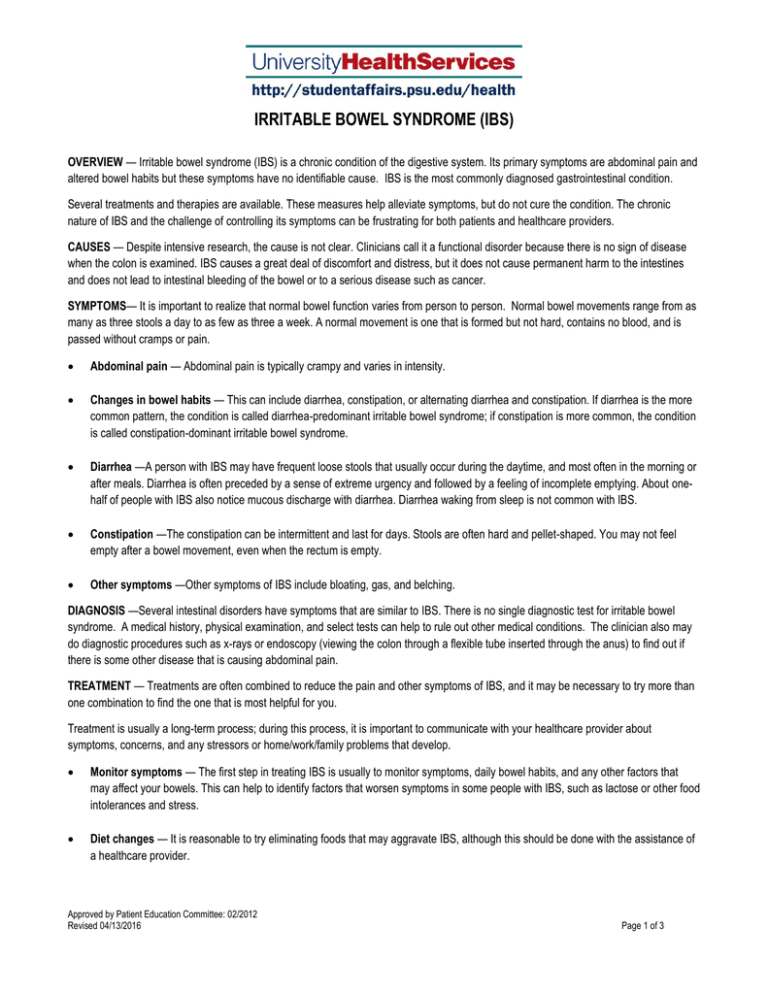
IRRITABLE BOWEL SYNDROME (IBS) OVERVIEW — Irritable bowel syndrome (IBS) is a chronic condition of the digestive system. Its primary symptoms are abdominal pain and altered bowel habits but these symptoms have no identifiable cause. IBS is the most commonly diagnosed gastrointestinal condition. Several treatments and therapies are available. These measures help alleviate symptoms, but do not cure the condition. The chronic nature of IBS and the challenge of controlling its symptoms can be frustrating for both patients and healthcare providers. CAUSES — Despite intensive research, the cause is not clear. Clinicians call it a functional disorder because there is no sign of disease when the colon is examined. IBS causes a great deal of discomfort and distress, but it does not cause permanent harm to the intestines and does not lead to intestinal bleeding of the bowel or to a serious disease such as cancer. SYMPTOMS— It is important to realize that normal bowel function varies from person to person. Normal bowel movements range from as many as three stools a day to as few as three a week. A normal movement is one that is formed but not hard, contains no blood, and is passed without cramps or pain. Abdominal pain — Abdominal pain is typically crampy and varies in intensity. Changes in bowel habits — This can include diarrhea, constipation, or alternating diarrhea and constipation. If diarrhea is the more common pattern, the condition is called diarrhea-predominant irritable bowel syndrome; if constipation is more common, the condition is called constipation-dominant irritable bowel syndrome. Diarrhea —A person with IBS may have frequent loose stools that usually occur during the daytime, and most often in the morning or after meals. Diarrhea is often preceded by a sense of extreme urgency and followed by a feeling of incomplete emptying. About onehalf of people with IBS also notice mucous discharge with diarrhea. Diarrhea waking from sleep is not common with IBS. Constipation —The constipation can be intermittent and last for days. Stools are often hard and pellet-shaped. You may not feel empty after a bowel movement, even when the rectum is empty. Other symptoms —Other symptoms of IBS include bloating, gas, and belching. DIAGNOSIS —Several intestinal disorders have symptoms that are similar to IBS. There is no single diagnostic test for irritable bowel syndrome. A medical history, physical examination, and select tests can help to rule out other medical conditions. The clinician also may do diagnostic procedures such as x-rays or endoscopy (viewing the colon through a flexible tube inserted through the anus) to find out if there is some other disease that is causing abdominal pain. TREATMENT — Treatments are often combined to reduce the pain and other symptoms of IBS, and it may be necessary to try more than one combination to find the one that is most helpful for you. Treatment is usually a long-term process; during this process, it is important to communicate with your healthcare provider about symptoms, concerns, and any stressors or home/work/family problems that develop. Monitor symptoms — The first step in treating IBS is usually to monitor symptoms, daily bowel habits, and any other factors that may affect your bowels. This can help to identify factors that worsen symptoms in some people with IBS, such as lactose or other food intolerances and stress. Diet changes — It is reasonable to try eliminating foods that may aggravate IBS, although this should be done with the assistance of a healthcare provider. Approved by Patient Education Committee: 02/2012 Revised 04/13/2016 Page 1 of 3 IRRITABLE BOWEL SYNDROME (IBS) Lactose — Many clinicians recommend temporarily eliminating milk products since lactose intolerance is common and can aggravate IBS or cause symptoms similar to IBS. The greatest concentration of lactose is found in milk and ice cream, although it is present in smaller quantities in yogurt, cottage and other cheeses, and any prepared foods that contain these ingredients o All lactose containing products should be eliminated for two weeks. If IBS symptoms improve, it is reasonable to continue avoiding lactose. If symptoms do not improve, you may resume eating lactose-containing foods. Foods that cause gas — Several foods are only partially digested in the small intestines. When they reach the colon (large intestine), further digestion takes place, which may cause gas and cramps. Eliminating these foods temporarily is reasonable if gas or bloating is bothersome. o The most common gas-producing foods are legumes (such as beans) and cruciferous vegetables (such as cabbage, Brussels sprouts, cauliflower, and broccoli). In addition, some people have trouble with onions, celery, carrots, raisins, bananas, apricots, prunes, sprouts, and wheat. Increasing dietary fiber — Increasing dietary fiber (either by adding certain foods to the diet or using fiber supplements) may relieve symptoms of IBS, particularly if you have constipation. By reading the product information panel on the side of the package, you can determine the number of grams of fiber per serving. Fiber may also be helpful in people with diarrhea predominant symptoms since it can improve the consistency of stools. o A bulk-forming fiber supplement (such as psyllium or methylcellulose) may also be recommended to increase fiber intake since it is difficult to consume enough fiber in the diet. Fiber supplements should be started at a low dose and increased slowly over several weeks to reduce the symptoms of excessive intestinal gas, which can occur in some people when beginning fiber therapy. Psychosocial therapies — Stress and anxiety can worsen IBS in some people. The best approach for reducing stress and anxiety depends upon your situation and the severity of your symptoms. Have an open discussion with your clinician about the possible role that stress and anxiety could be having on your symptoms, and together decide upon the best course of action. o Some people benefit from formal counseling, with or without antidepressant or antianxiety medications. Cognitive behavioral therapy helps you to focus on a particular problem in a limited time period. You learn how your thoughts contribute to anxiety or stress and learn how to change these thoughts. o Participation in a support group can also be valuable. o Many patients find that daily exercise is helpful in maintaining a sense of well-being. Exercise can also have favorable effects on the bowels. MEDICATIONS— Although many drugs are available to treat the symptoms of IBS, these drugs do not cure the condition. The choice among these medications depends in part upon whether you have diarrhea, constipation, or pain- predominant irritable bowel syndrome. As a general rule, medications are reserved for people whose symptoms have not adequately responded to more conservative measures such as changes in diet and fiber supplements. Anticholinergic medications — Anticholinergic drugs block the nervous system's stimulation of the gastrointestinal tract, helping to reduce severe cramping and irregular contractions of the colon. Antidepressants — Many tricyclic antidepressants (TCAs) have a pain relieving effect in people with IBS. The dose of TCAs is typically much lower than that used for treating depression. It is believed that these drugs reduce pain perception when used in low doses, although the exact mechanism of their benefit is unknown. o TCAs also slow movement of contents through the gastrointestinal tract and may be most helpful in people with diarrheapredominant irritable bowel syndrome. Approved by Patient Education Committee: 02/2012 Revised 04/13/2016 Page 2 of 3 IRRITABLE BOWEL SYNDROME (IBS) o Selective Serotonin Reuptake Inhibitors, another class of antidepressants, may be recommended if you have both IBS and depression. Antidiarrheal drugs — The drugs loperamide (Imodium®) or diphenoxylate with atropine (Lomotil®) can help slow the movement of stool through the digestive tract. However, clinicians usually recommend that these drugs should only be used as needed rather than on a continuous basis. Anti-anxiety drugs — Anti-anxiety drugs reduce anxiety. Anti-anxiety drugs are occasionally prescribed for people with short-term anxiety that is worsening their irritable bowel syndrome symptoms. However, these drugs should only be taken for short periods of time since they can be addictive. Alosetron — Alosetron (Lotronex®) blocks a hormone that is involved in intestinal contractions and sensations. It is approved to treat women with IBS whose predominant symptom is diarrhea. However, it was withdrawn from the market soon after its introduction because of concerns related to safety. It was reintroduced and is currently available, although certain prescribing guidelines must be followed. Lubiprostone — Lubiprostone (Amitiza®) is available for treatment of severe constipation and IBS in women over 18 years who have not responded to other treatments. It works by increasing intestinal fluid secretion. It is expensive compared to other agents. Antibiotics — The role of antibiotics in the treatment of IBS remains unclear. More research is needed before antibiotics are recommended for treatment of irritable bowel syndrome. HERBS AND NATURAL THERAPIES— A number of herbal and natural therapies have been advertised for the treatment of IBS. Unfortunately, there is no significant evidence supporting their benefit. PROGNOSIS — Although IBS can produce substantial physical discomfort and emotional distress, most people with IBS do not develop serious long-term health conditions. Furthermore, the vast majority of people with IBS learn to control their symptoms. Call the UHS advice nurse at (814) 863-4463 if any of the following happens: Fever Bleeding Weight loss Persistent severe pain Nighttime diarrhea Worsening of symptoms In an emergency go to Mount Nittany Medical Center or call 911 for an ambulance. Test Results and Advice Nurse Please call the nurse for test results and advice: 863-4463 Appointments Appointments can be made online via the UHS website, by phone or in person. If you are unable to keep your appointment, please call and cancel. Otherwise you will be charged for the visit. To schedule or cancel appointments call 863-0774 or schedule your appointment online through the UHS website This content is reviewed periodically and is subject to change as new health information becomes available. This information is intended to inform and educate and is not a replacement for medical evaluation, advice, diagnosis or treatment by a healthcare professional. Approved by Patient Education Committee: 02/2012 Revised 04/13/2016 Page 3 of 3
